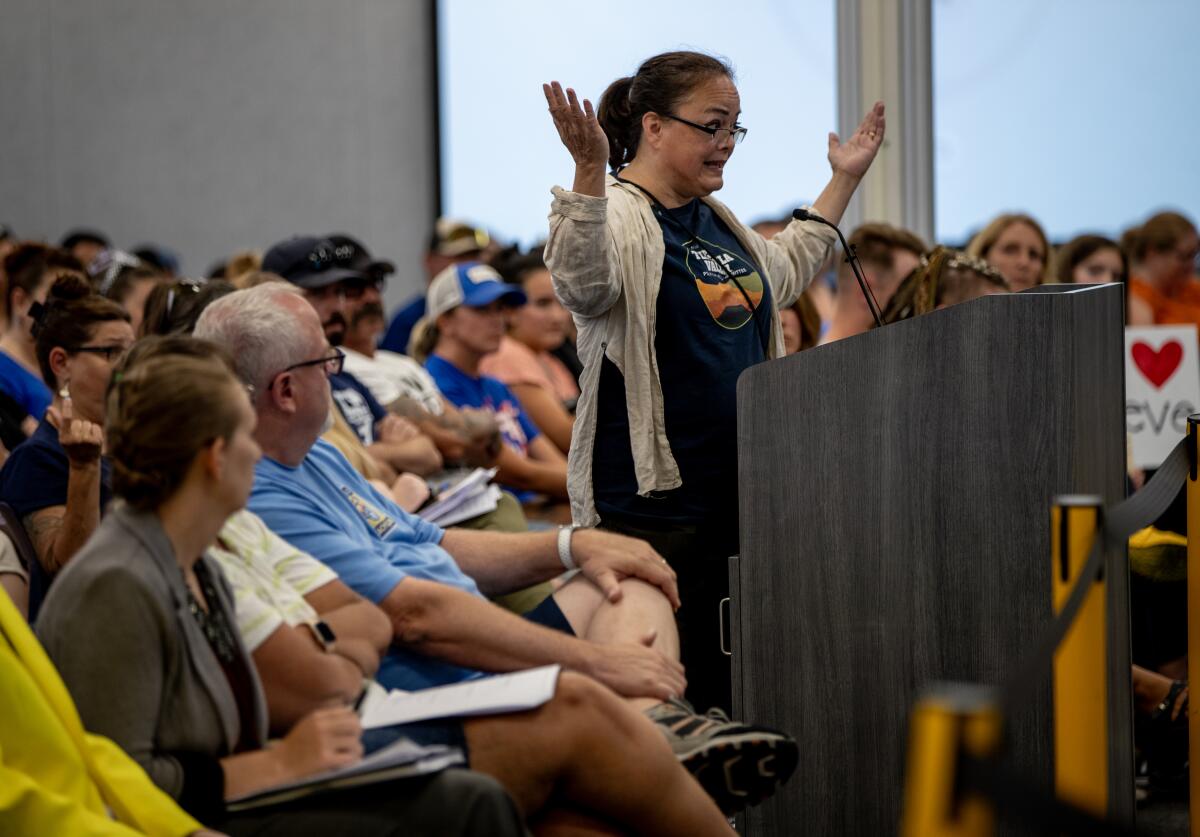Newsom bars school book bans: LGBTQ+ textbook bill signed into law amid growing culture wars

- Share via
SACRAMENTO — School districts that seek to ban textbooks that portray LGBTQ+ people and other historically marginalized groups could face hefty fines under a new California law signed by Gov. Gavin Newsom on Monday.
The legislation is the culmination of the Democratic governor’s fight against a majority-conservative school board in the Riverside County city of Temecula. The board opposed materials in the summer because of their portrayal of gay rights icon and slain San Francisco politician Harvey Milk.
School districts statewide will face more scrutiny of curriculum decisions regarding social science materials, which must feature “inclusive and diverse perspectives,” including the role and contribution of Latino Americans, LGBTQ+ Americans and other ethnic and cultural groups.
The bill is an effort to “reaffirm” and more strictly enforce state laws that already mandate lessons on ethnic studies and LGBTQ+ history. It comes as school boards in California’s Republican-leaning districts have approved policies reflective of national GOP culture wars regarding “parental rights” over issues such as gender identity and racial history.
Newsom signed the bill on video alongside its author, Assemblymember Corey Jackson (D-Perris), on Monday, slamming what he called a national “cultural purge” led by Republican leaders who have sought to limit what textbooks are allowed in schools.
“We have school districts large and small banning books, banning free speech, criminalizing librarians and teachers,” Newsom said Monday. “We want to do more than just push back rhetorically against that, and that’s what this legislation provides.”
Earlier on Monday, Newsom announced that he would publicly debate Florida Gov. Ron DeSantis, who is running for president and is credited with inspiring an upswing in school book bans nationally.
Under the new California law, noncompliant school districts will face fiscal penalties, with the state subtracting the purchase price of sufficient textbooks from a district’s local control funding formula allotment. In the Temecula case, that was estimated to be $1.5 million, but the board reversed course after Newsom’s threat to intervene.
The bill adds to the job duties of local superintendents, who will now be tasked with overseeing and correcting any textbook decisions made by elected school board members that are prohibited.
“AB 1078 is doing some heavy lifting,” Kindra Britt, a spokesperson for the California County Superintendents, said Monday. “The state is trying to balance the rights of students without adding oxygen to highly politicized local conflicts. That’s not easy.”
The bill was supported by advocacy groups including the ACLU, which said it was necessary for Newsom to intervene in school policies discriminatory against LGBTQ+ students and students of color.
But the bill faced opposition from parents who said it would allow for age-inappropriate materials in schools, and from a list of local officials at schools — and not just officials representing conservative districts.
The California School Boards Assn. called the bill “heavy-handed,” warning that it could complicate local education decisions by involving state and county officials when laws are already in place to ensure inclusive textbooks.
CSBA spokesperson Troy Flint said Monday that many school officials “understand the motivation” of the legislation and are supportive of inclusive education but believe local control is best.
There are concerns that the bill sets a precedent to allow the state to override local school decisions beyond the scope of the current textbook issue.
“There are a lot of concerns related to implementation,” Flint said Monday. “I think this bill, to a certain extent, was pushed forward without thinking about what could happen in a different scenario. Really, the best laws should make sense and be fair no matter what the political landscape is or who is in power at that particular moment.”
More to Read
Sign up for Essential California
The most important California stories and recommendations in your inbox every morning.
You may occasionally receive promotional content from the Los Angeles Times.














